Are you interested in Positive Parenting Tips for toddlers? Want to use more Positive Parenting strategies in your toddler parenting?
This is the post for you! TEN easy, simple positive parenting tips for toddlers you can try.
#1. Positive Parenting Tip: focus on the good.
Kids become what we see in them. Find the good where ever you can, and call it out to your kids – let them know what they’re doing well, and I promise you will see more and more of it.
I get it, this can be hard. It can be especially hard if your child is having very challenging behaviors and needs a lot of support and correction. Finding the good is even more important in these situations, because the child is hearing so much corrective feedback that can damage self esteem and exacerbate challenging behaviors.
I don’t care how small the win is! Find the good often, and build your child up!
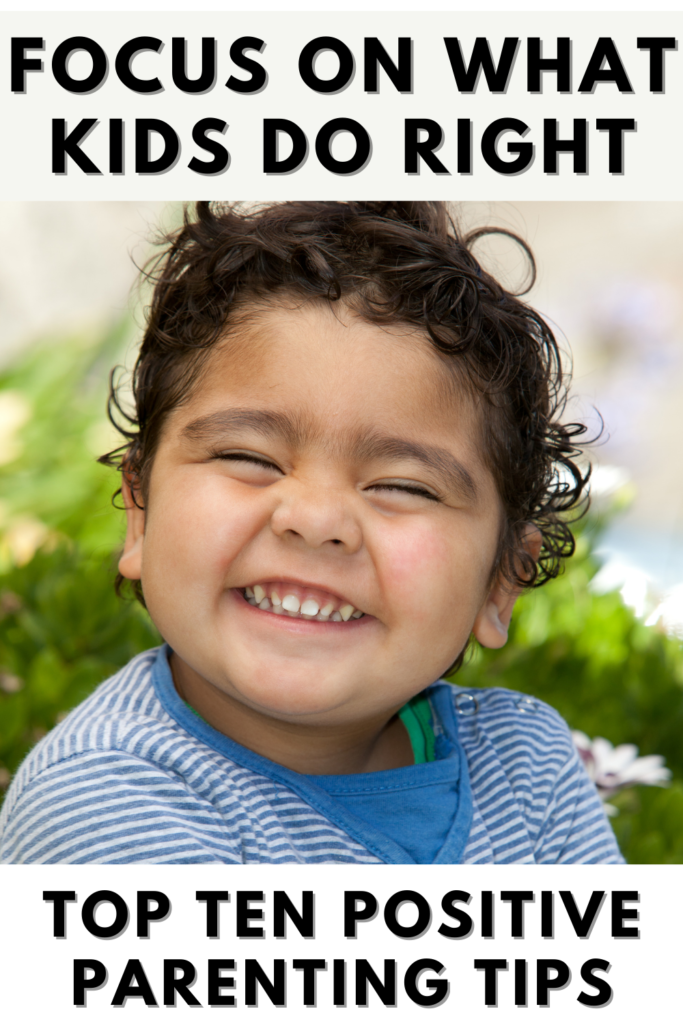
#2. Positive Parenting Tip: give choices when you can.
When kids feel empowered and know their options, they are more likely to cooperate, connect, and collaborate with us. As a result, we see fewer challenging behaviors.
No one wants to be told what to do all day long – adults included! Give the child a choice (if you can) – red shoes or green shoes, ride in the stroller or walk, climb into the carseat or have mom lift you. The key is only offering options you’re actually ok with! Whatever your child chooses, it’s a win!
Giving them autonomy whenever possible will lead to greater connection and cooperation when the task isn’t optional!
#3. Positive Parenting Tip: say YES more.
As adults, it can be tempting to place all kinds of unnecessary parameters on our kids’ play and behavior. Creativity rocks, and I try not to ever discourage it.
Yes, kids need limits on the things that matter – safety is a must and how we treat people matters! But! If the behavior is not hurting other people or property, then it’s probably ok!!
Next time you go to stop your child or nix their idea, consider why you’re stopping them. Can we make it work? Does this really need to be a limit?
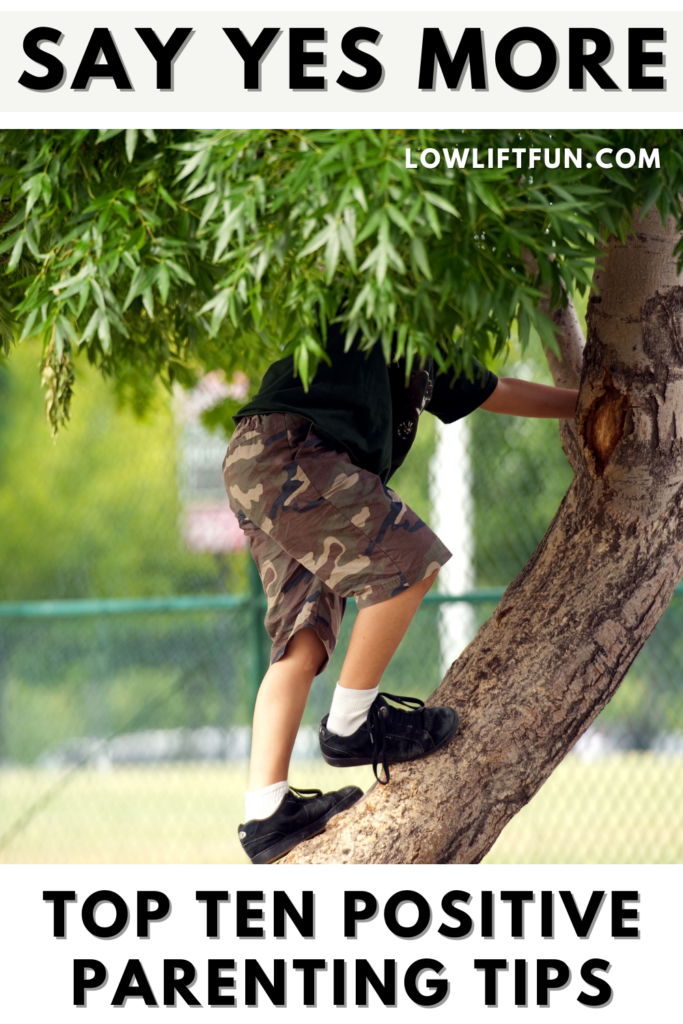
#4. Positive Parenting Tip: set clear boundaries and limits.
Say yes when you can, but also know that positive parenting is not permissive parenting. Kids thrive with boundaries and limits on the things that matter – they help children feel safe and make the environment predictable. And without boundaries… it’s chaos!
All feelings are ok, all behaviors are not. We can hold space for all feelings AND set boundaries around behavior. It’s our kids’ job to test the limits, and it’s our job to confidently and respectfully hold our boundary.
Learn more about reducing power struggles with predictable routines here.
#5. Positive Parenting Tip: look for the need behind the behavior – how can we meet that need?
What’s the need behind behavior? Is there a way we can set the limit AND meet their need??
For example, if your child is jumping on a nice sofa where they could break something, the underlying need may be that they need jump and move. If we tell them, “stop! no jumping in the living room,” they still don’t have an option to get the movement they’re seeking. Try this, “I can’t let you jump on the couch, but we can jump in the basement, outside, or on the mini trampoline!” Find the “yes” alternative and direct them to that!
#6. Positive Parenting Tip: don’t ask if it’s not actually a question!
It can be tempting to frame directions as questions. “Are you ready for a bath?” “OK everyone, want to come to the table for dinner?” “Ready to go up for bed?”
While these are common ways of speaking, kids will often take these as literal questions. We’re opening ourselves up to a power struggle, because we’re offering our directions as a choice.
Ask questions when the choice is real, but don’t frame the instructions themselves as a question. Instead of “ready for bath?” you could say, “it’s time for bath – do you want bubbles or no bubbles tonight?”
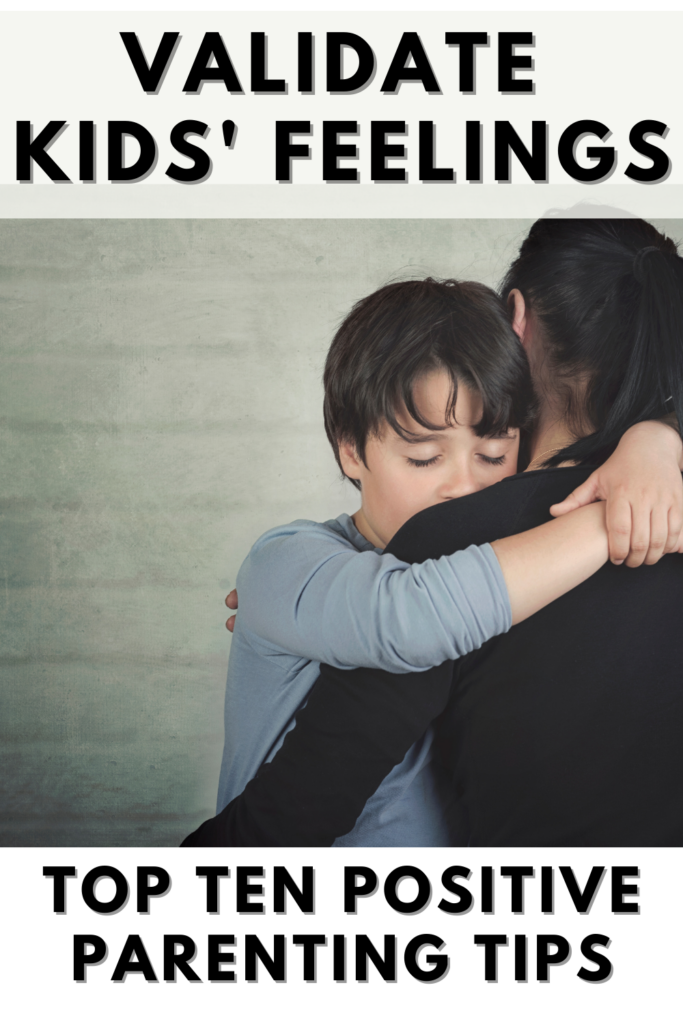
#7. Positive Parenting Tip: validate kids’ emotions.
Instead of saying, “you’re fine!” or “stop crying!” it’s helpful to first affirm what our kids are feeling – “that was scary” or “you’re feeling frustrated.” This helps them to identify their own emotions and acknowledges their feelings.
We can also teach our kids to navigate uncomfortable emotions in healthy ways. Do they want comfort? An ice pack? To cry and release the emotion? – it’s normal to have unpleasant, uncomfortable emotions at times, and supporting kids in navigating those emotions is key!
#8. Positive Parenting Tip: model the coping strategies and communication you want to see from your child.
Model and narrate the feelings you sense in your body when you feel frustrated – “my face is hot, my muscles feel tense, and I can tell I need a deep breath right now.” Or say, “I’m feeling overwhelmed. I’m going to step away and take a moment to regroup.”
Kids learn by watching us. Model and narrate identifying your own emotions as often as you can!
#9. Positive Parenting Tip: teach kids to ask for love, hugs, or TLC when they need it.
When kids show tough behaviors, it’s often because they are struggling to cope and self-regulate. Behind the behavior they are often hurting – jealous of a sibling, mad something isn’t the way they want it, nervous about something coming up. (Same goes for adults by the way!)
I say to my kids, “I can tell you’re having a hard time. It’s ok to ask for TLC.” (A reader once asked what TLC is – it’s an acronym for tender loving care, which means getting snuggles and love in our fam.)
Explicitly teaching kids HOW to communicate in a healthy way when they’re struggling is a communication skill they need for life. It’s ok to tell people you are hurting and need support! (AND that part goes for adults as well!)
Kids don’t have to SHOW us they’re hurting, we can teach them to tell us. Looking for more support teaching coping skills? Check out this blog post to learn how visual supports can help!
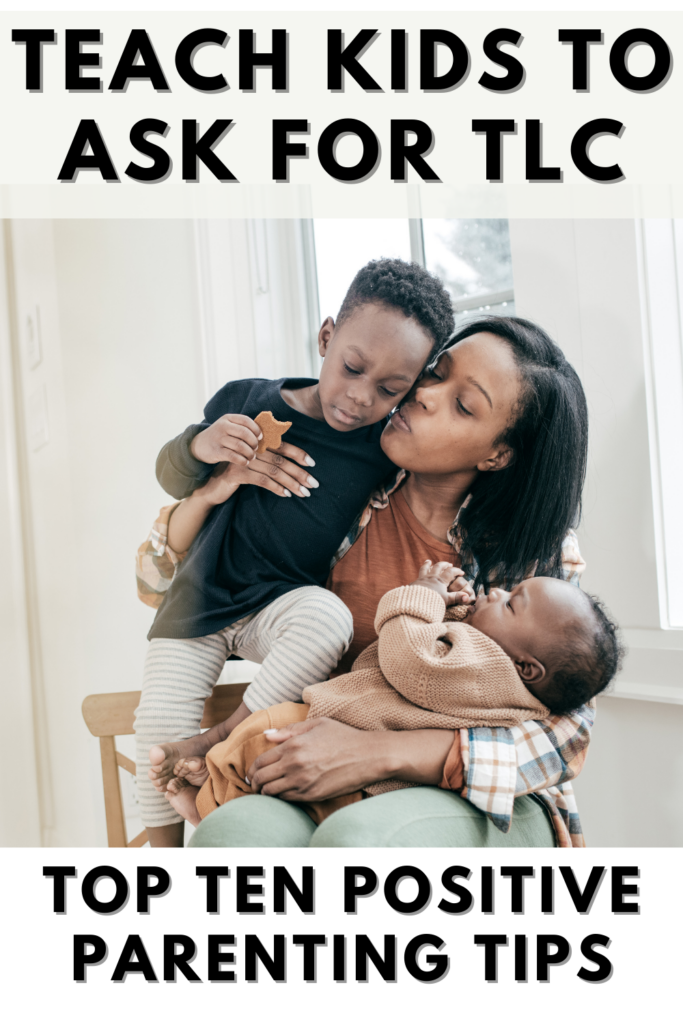
#10. Positive Parenting Tip: ditch competitive thoughts and trust your child.
Remind yourself again and again that PLAY is enough. Young kids learn THROUGH play. Take the pressure off of them (and yourself!), and embrace PLAY. Child development is not a competition. Memorizing letters or shapes or counting early doesn’t set kids up for a better life – you know what will help?! A love for learning, being curious and self directed, social emotional skills, fine motor skills built through play that form the foundation for later writing – let them PLAY and develop all of those!
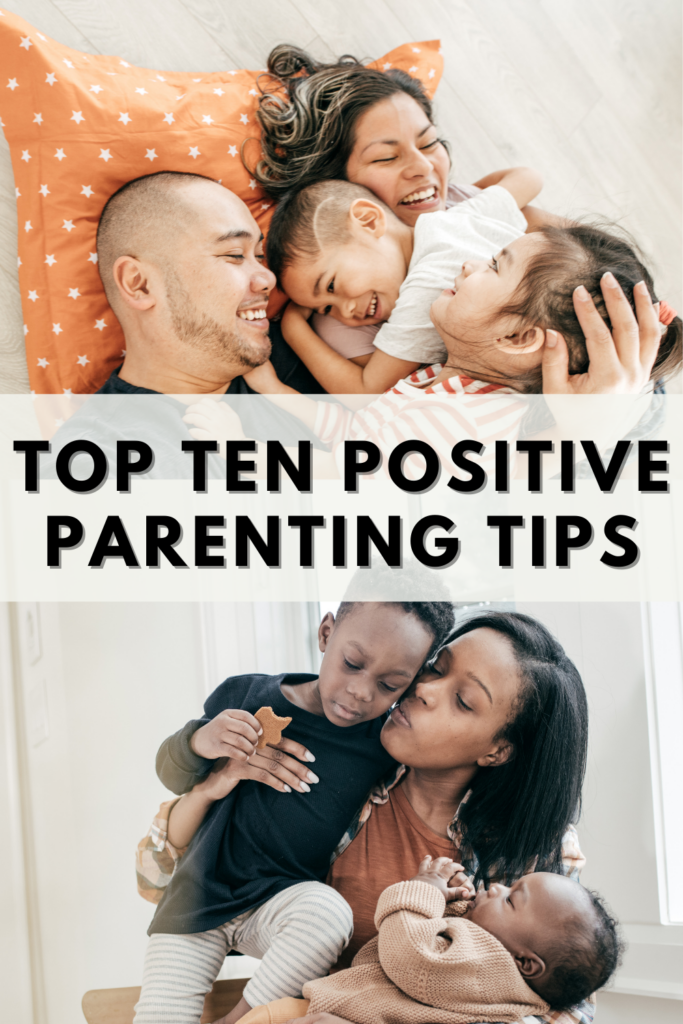
Remember that developmentally it’s normal and healthy for kids to test limits and struggle to regulate their emotions! So many normal behaviors of childhood are deemed as being “not good” in our society and frankly it’s bologna. NO child is bad, and you’re not a bad parent! Wonderful kids have tough moments – we’re there to help them.
Thanks for reading! And I hope you find these Positive Parenting Tips for Toddlers helpful in your own home. Remember to sign up for the Low Lift Fun email list to get easy kids’ activities and parenting tips delivered straight to your inbox!
Looking for simple play invitations to spark play. Begin here!
Do you need baby activities?! Check out 50 Activities for Babies and Young Toddlers here!!
Have a toddler? You will love 50 Low Prep Toddler Activities found here!
Preschool aged kids? Here are 50 Preschool Activities kids will LOVE!
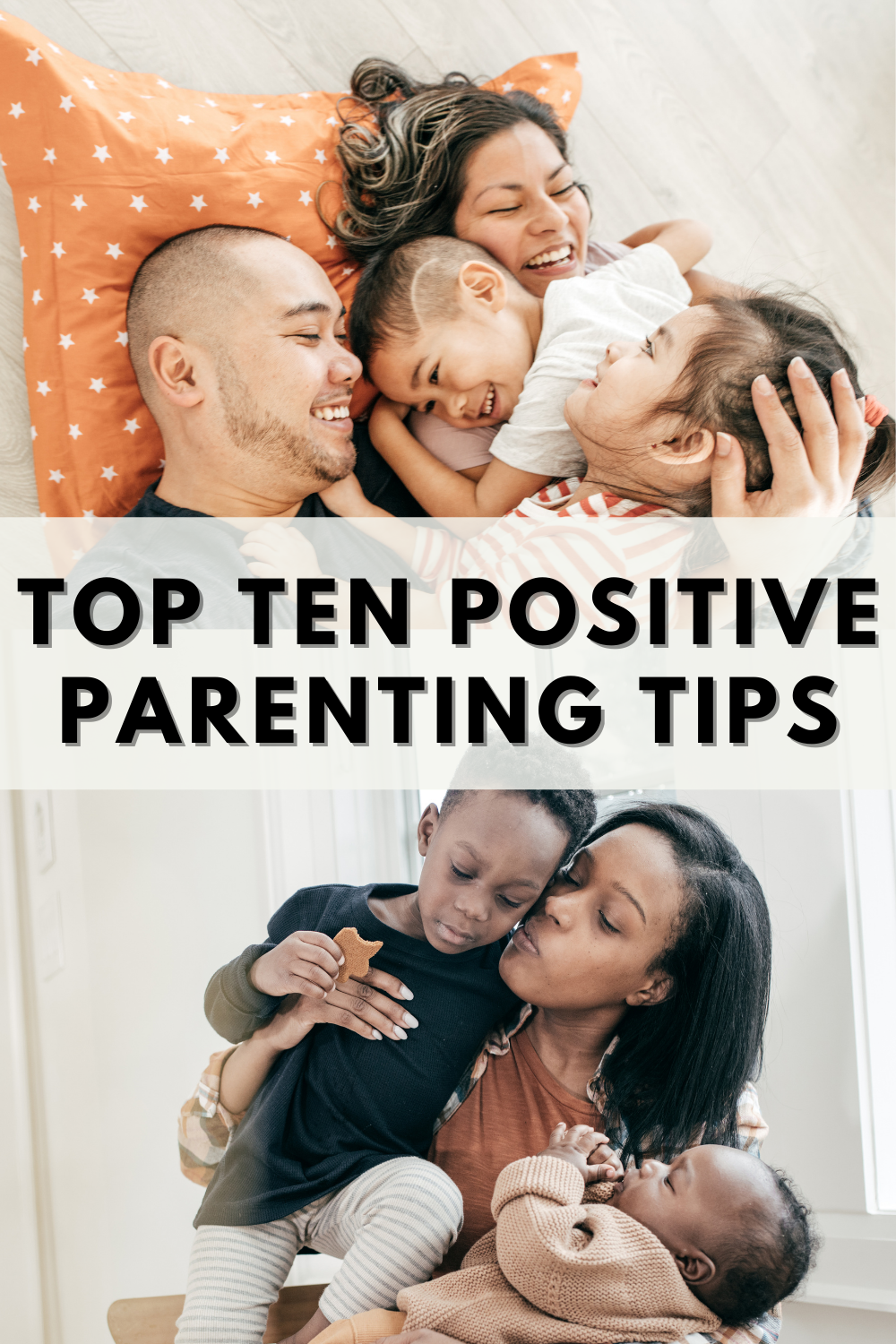
Wonderful tips as always Beth Ann! Thank you for sharing!
Thanks so much!!
These are so great! I definitely need to say YES more!! Thanks, Beth Ann!
I’m so glad it resonated for you!! 🙂